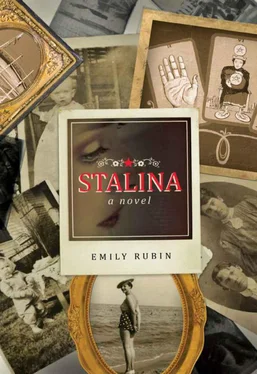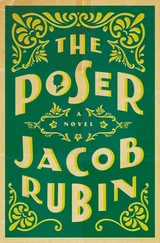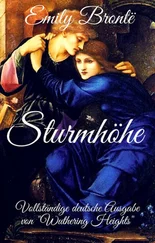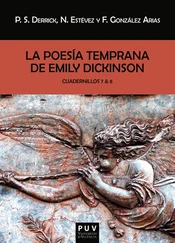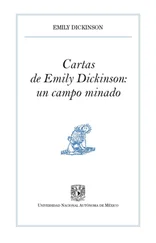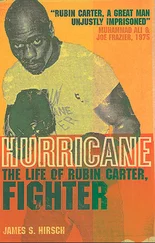“Stalina’s mother has passed away,” Amalia told him.
He took a bite and said, “Sorry to hear that. It sounded like you were celebrating.”
He went back downstairs with a chicken leg in his mouth, the carton of milk, and a box of gingersnap cookies under his arm. I could hear music with a loud bass beat coming from his underground lair.
“Alexi stays up all night and loves to snack in the morning on leftovers. His father was exactly the same,” Amalia said as she sat down and put her head in her hands.
Her husband, Yossef, was a construction worker who died when he fell from the roof of St. Isaac’s Cathedral. He had been part of a crew that was repairing the copper gutters. Alexi was only two years old then. Yossef’s death was considered his own fault because the police found a half bottle of vodka under the seat of his car. Amalia and Alexi were isolated and scorned because Yossef’s actions were considered a crime against the state. Amalia made a public appeal to clear her husband’s name. She told the authorities it was her bottle of vodka and that he only drank beer because it helped to steady his hand. If it had been beer, he would have been a hero, but giving a bad name to vodka was a no-no. The authorities believed Amalia’s story, but they were still unhappy with the mess Yossef’s splattered body left on the plaza outside the cathedral. A couple who were sitting on a bench kissing when the accident occurred filed for trauma assistance and were given two months’ pay and an apartment in the country to go to on weekends. Amalia received nothing. She left Leningrad angry and sad. That was 1980.
The cuckoo clock struck half past six; the sun was just starting to come up. It was otherwise very quiet in the kitchen. Amalia’s cats, Shosta and Kovich, wandered in for their morning meal. Amalia dried her tears with the palms of her hands and kissed my forehead before going off to bed.
“Thank you,” I said.
“You look tired, Stalina. Why don’t you go to bed, too,” she said as she held my face between her hands.
“I will, after a while.”
I went outside and sat on the front stoop as the sunlight began to spread across the patches of grass and mounds of dirt and rocks in the front yard. Amalia had started to dig things up to put in a garden. The ground was very hard, so she had worked it with a pickax and a shovel. She left her shovel standing upright, wedged between two boulders. It reminded me of my father’s shovel in the photograph I had taken so many years before, and one of the many poems he wrote about gardening tools. Working in the garden inspired him. The morning light came through the trees and warmed the handle of Amalia’s shovel. One of Father’s poems was about Mother and her garden. He called it “Sophia’s Garden.”
My wife stands by
With our shovel in her hands,
Another cedar, birch, juniper, or
Wisteria to address.
A woodcut from the thirteenth century
Shows Deucalion, son of Prometheus,
Shouldering a mattock.
Agrarians one and all,
His wife, Pyrra, stands by with a long-handled shovel,
Fields and beds to cultivate.
Having escaped the efforts of Zeus to destroy all mankind,
They survived his viral floods,
The waves receded,
At Parnassus, they rebuild on higher ground.
My wife stands by and
I take the shovel from her soft hands
To dig a ditch, move some stones,
Feed our family,
Cultivate.
From Roman forge to smelter’s hammer,
Revolution of industry,
The shovel,
Ancient, knowing tool,
Invention that can serve us all.
My wife stands by,
Holding in her arms the iris, peonies, and daylilies,
Listening for the sound
Of the shovel digging deep into the earth.
Like the deity survivors before us,
We stand with hatch, hoe, trowel, scythe, and sickle,
Our tools taken back from the hands of thieves,
Our bodies smeared with blood,
Washed away by the rains of time.
My wife stands by,
Her arms open wide.
She shows off her gladiolas, lupines,
And bleeding heart vines.
A shovel,
And the sun to shine,
Is all we need for now.

Chapter Seventeen: Commuters’ Dream
The sun was up and Amalia was sleeping after staying up so late to grieve—and dance—with me after my mother’s death. I could hear her wheezing from down in the kitchen. I wouldn’t disturb her by going up the creaky stairs to my attic room. I’d go back to the motel. It was six forty-five in the morning. Mr. Suri would be tired but happy. It was most likely a busy night. Business picks up when it rains.
The people riding the bus at this hour, only seven in total, were mostly women who took care of the children and houses of people who went off to work in Hartford city center. We rode the bus as one that morning. All our energies propelled us through the streets of Berlin, Connecticut, to our places of employ. We were the workers of this dying city. It is dying; otherwise there would not be an underworld in which the Liberty Motel and the other short-stay establishments could survive.
My clothes were still damp from the rain of the night before. The sun was coming through the trees, but the massive dark clouds were moving overhead, and the wind had gone sharp and cold. The bus passed the same places I saw when I first moved here. Who could ever forget Pete’s-A-Place or the Glass Eye Emporium, which appeared to have closed its doors for good. The sign of a human eye with a blue neon iris was outside the store in a heap of discarded wooden cabinets, small round mirrors, and metal chairs with headrests. I wondered where their customers go now.
The road was slick and shiny, and the smell of rain and oil seeped into the bus as the wheels spun along. The woman sitting across from me was wearing a white uniform that was much too tight for her. Her ankles were swollen in light-colored panty hose, and she was knitting an infant-sized sock on three small needles out of multicolored yarn. Next to her was a young woman, with thin arms and long hands, who was sleeping with her head tilted slightly to the left. She reminded me of one of the cranes that nested in the grasses along the shores of the Gulf of Finland. The woman next to me still smelled fresh from her morning bath. The scent of peaches surrounded her. She had a large book open in her lap. I could see it was a textbook for nursing. She was reading about techniques for drawing blood.
“Ask the patient if they are right or left handed. Wrap the rubber tourniquet around the upper arm of the hand they use less frequently. Tap with two fingers on the top side of the elbow joint,” the instructions explained.
A shadow cast from the sun coming over our shoulders looked like a bird landing across the page where needle insertion was described. As I leaned my head back and looked up and out the window, I could see a cloud in the shape of a dog’s head. Its mouth was wide open, and it looked like the dog was howling at the fading moon. The seats in the bus were molded blue plastic, and the dry heat came up from behind my legs. My clothes had dried and no longer stuck to me. The bus driver was wearing a black kerchief tied around his head. He was sweating quite a lot and kept pulling out a bandana every few minutes to wipe his forehead and neck. The other seven people on the bus were silently staring into the middle aisle as if it were a bottomless canyon. My eyes felt tired and swollen from the crying and lack of sleep. I wondered if my sadness made me smell different. The woman with the book closed her eyes and started to sleep and lean against me. She must have been tired from working and studying and going to school. The book was slipping off her lap.
Читать дальше
